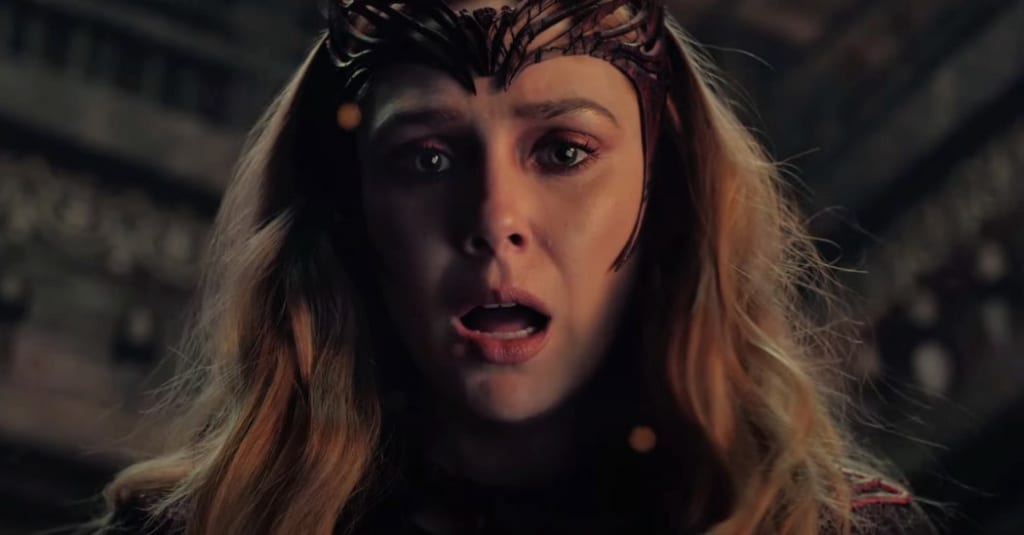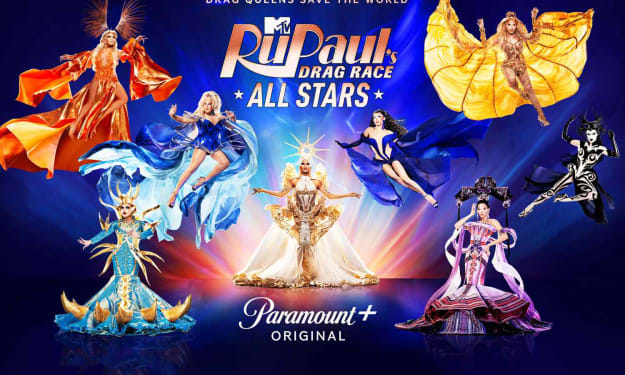Exploring Toxic Motherhood In "Doctor Strange in the Multiverse of Madness"
Magical powers, alternate dimensions, anti-vaxxers, and homophobia

The second Doctor Strange movie, the Multiverse of Madness (MoM), tackles a lot of elements. It serves as not only a vehicle to expand on the multiverse (a real, theoretical concept, if you believe it) where the MCU is now connected to an infinite amount of parallel universes, but an informal introduction to mutants, as well as a sequel to the first Doctor Strange movie and the TV show WandaVision. That's a lot to cover here, but the MCU has always weaved countless threads at once: that's kind of its whole point.
The critical response to MoM has been mixed. Some loved it. Some hated it. Many more thought it was just okay. My personal take is that although it was fun to see characters like America Chavez (Xochitl Gomez-Deines) and Patrick Stewart's Charles Xavier, the film did not utilize its multiverse concept very well. After watching Everything, Everywhere, All At Once, I kept waiting for MoM to up the ante on fantastical premises, only for that moment never to arrive.
Yet, it's the motivation of the primary antagonist of MoM, Wanda Maximoff (Elizabeth Olsen), that I want to focus on here. Her desire to be a mother at any cost represents how the institution of motherhood can be a toxic force in our society, and I think that is a topic worthy of discussion.
What is Motherhood?
Note: I am not calling individual mothers toxic or evil. We are talking about motherhood as a social construct, by which I mean a concept created by collective "consensus" in our society. It can also be viewed as an institution (i.e., a structure with specific rules, norms, and expectations, usually enforced through direct and indirect violence). In other words, motherhood is a concept we have not only made up but one we have actively encouraged others to follow.
This statement may be controversial to some who believe that motherhood is a natural phenomenon intrinsic to the human experience, but the truth is that the way society has conceptualized childrearing has changed throughout history, even within the context of the US. Mothers used to be far more hands-off with primary childcare than they are today, with expectations of parenthood having increased dramatically over the years.
The further back we go, the more things get "stranger" from our perspective. For much of European history, childrearing was a devalued activity that aristocratic women would happily outsource to wet nurses, nannies, and other institutions of care. As Cait Stevenson wrote about the medieval era: "Wet nursing was a low status, low paying task, even in the context of 'women's work.'" Which is quite the contrast to today, where breastfeeding from mothers is heavily encouraged.
Going back even further, anthropologist Blaffer Hrdy has argued that originally childrearing had far more cooperation between the sexes. It relied on a dense network of care between parents and "alloparents" (i.e., grandparents, siblings, friends, etc.) and truthfully still does. Mothers, Hrdy argues, were never biologically wired to raise children all on their own. As the old saying goes, "it takes a village."
Yes, people get pregnant, and if they are lucky enough, the children they have receive some form of care, but our current conceptualization of what that care is — i.e., motherhood and family — is enforced through both incentives and violence. From child support to marriage, there are all sorts of institutions that reward motherhood, not to mention social recognition, especially if you hold an identity that would otherwise "other" you. In the words of writer Sarah Schulman in describing queer, single moms:
“Single motherhood, which is significant among queer women, has its own specific emotional pitfalls. One’s self-perception as a romantic failure or as a failed partner may be erased by the kind of normativity produced by motherhood. Queer women without partners are particularly vulnerable to the promise of legitimacy and social worth if they subsume sex and love into parenting…”
This desire to strive for motherhood as an act of normalcy is not surprising. Not long ago, women in the states were legally bound to the role of mother and spouse, often not being able to own property. While women's legal rights have increased in some parts of the world, this mindset that women are meant to be mothers and mothers alone still exists to this day. Single women are judged very harshly for deciding not to be mothers and are often pressured to take on this role by their peers and family.
So what does all this sociology nonsense have to do with the Multiverse of Madness, and more specifically, what does it have to do with Wanda Maximoff?
Wanda and Toxic Motherhood
Even though Wanda has godlike powers, she is still a woman in our society and susceptible to the pressure of achieving normalcy through motherhood. Like with what Schulman suggests, she seeks the role of mother to “make up for” her perceived failures as a romantic partner and an “other.”
The show WandaVision has her clinging to an idealized fantasy of motherhood as a coping mechanism for the death of her lover Vision (Paul Bettany). She enslaves the town of Westview and puppets its residents to act out a suburban fantasy where she creates a psychic version of Vision and two fake children to playact being a mother. Wanda is doing the one thing society is telling women to do, albeit in a twisted way.
The Multiverse of Madness, or MoM for short, heightens this desire. Wanda knows through her interactions with the Darkhold —i.e., an evil magical book that has "corrupted" her — that the multiverse has a version of reality where her fake children from Westview are real. Wanda now wants to travel to this reality because she believes she could be "happy" there, saying: "If you knew there was a universe where you were happy, wouldn't you want to go there?"
Given everything we've talked about so far, it's not hard to understand why she would think this way. People genuinely believe motherhood is, if not a justification, at least an empathetic reason for unspeakable acts of terror. As one Rotten Tomatoes reviewer commented on this film: "The trauma of losing parents and siblings and spouses and the desire for a mother to be with her children, combined with unlimited power and a demonic influence (the dark hold) it's the most awesome and believable motivation."
Wanda does a lot of terrible things to reach her objective of motherhood. She kills many people, including an alternate version of Captain Marvel and Mr. Fantastic, but she is doing so, she justifies, to protect her "children." "What if they get sick?" Wanda rationalizes on why she must drain America Chavez of her dimension-hopping powers, most likely killing America in the process. "In the infinite Multiverse, there's a cure for every illness. A solution to every problem. I won't lose them again."
Truthfully our society allows mothers and the patriarchs they serve to do a lot of awful acts under the banner of "protecting their children." For example, the anti-vaxxer movement is often framed by proponents as mothers defending their children from harm. Early support for this movement came from the irrational fear that vaccines would cause autism. While the initial paper that generated this fear has since been debunked, it has not stopped mothers from rallying around the general concern that vaccines are harmful. As one former anti-vaxxer described of her experience within the movement: "it's almost, like, thinking like you have this cheat code to keep your kids healthy, to keep your kids from getting autism and allergies and whatever else …they blame vaccines for everything."
Even though the diseases brought on by a lack of vaccination are far worse than the ableist fear of autism, it's this moral right to protect one's child over the collective good that comes up time and time again. As nurse Heather Dillard told CBS News: "I have the right to decide what to put into my child's body. Nobody has the right to put toxic chemicals into my son's bloodstream. That's taking my rights away, and it's very scary to me." It's all about the parent's individual right to protect their children, regardless of what harm that does to other families.
The concept of motherhood and "protecting one's children" is often used on a societal level to harm all sorts of people. Right now, we are going through a moral panic, as conservatives claim that LGBTQ+ people are grooming children when really what they are doing is being openly queer. This reactionary backlash is, unfortunately, being used as a justification to pass all sorts of terrible laws, and the construct of motherhood is front and center here. "I will do anything I can to protect kids," Rep. Marjorie Taylor Greene said after promising to introduce a national "Don't Say, Gay Bill."
From this perspective, Wanda is a dark mirror of the real thoughts and opinions of mothers all over this country. Give any one of these mothers the Godlike powers of the Scarlet Witch, and who knows what she would do.
A Maddening Conclusion
Ultimately, the Multiverse of Madness, or MoM, skewers these desires by making them the primary motivation of its villain — a refreshing change given that many marvel villains have historically had leftist motivations (see The MCU is for Rich People). With Wanda, we see how far the modern conception of motherhood can be pushed, and it's downright toxic.
The movie rejects Wanda's twisted form of motherhood. Her desires are not seen as justified, and it's the collective welfare of children that is advocated for. "Is there no peace in knowing that even though you can't be with the ones you love, there are worlds where you are together?" Sorcerer Supreme asks Wanda, a message that her alternative self eventually repeats back to her at the end of the film. This is the opposite moral of our society's "my children come first" mentality.
As we can see, it's not enough to want to protect your children, or in Wanda's case, to conjure them into existence. You have to care about other people too. And in an era where motherhood is often used as a pretext to perpetuate selfishness and harm others, the Multiverse of Madness refreshingly tells its viewers that there is more to think about than your individual family.
About the Creator
Alex Mell-Taylor
I write long-form pieces on timely themes inside entertainment, pop culture, video games, gender, sexuality, race and politics. My writing currently reaches a growing audience of over 10,000 people every month across various publications.






Comments
There are no comments for this story
Be the first to respond and start the conversation.